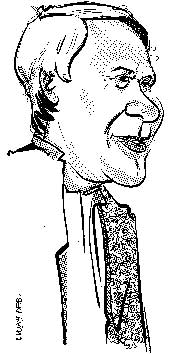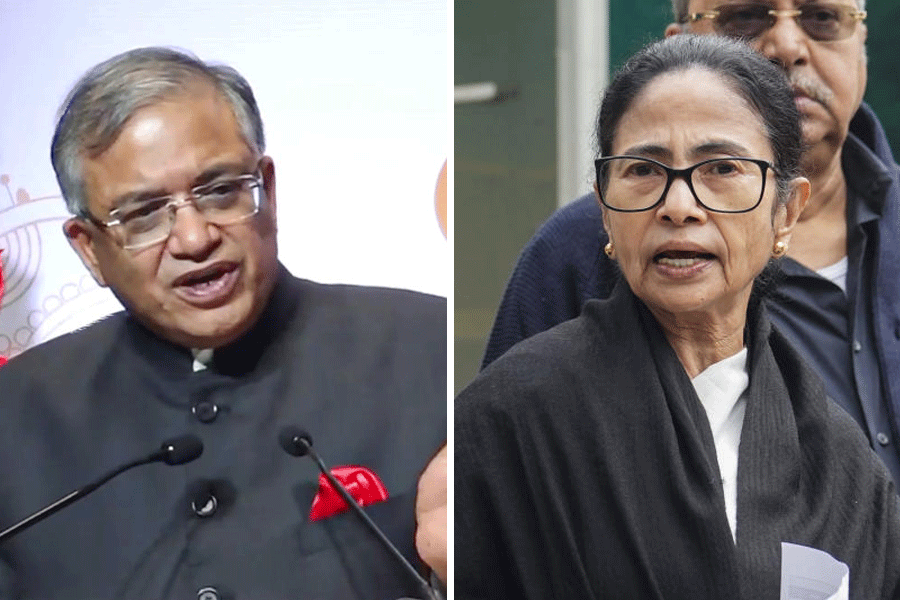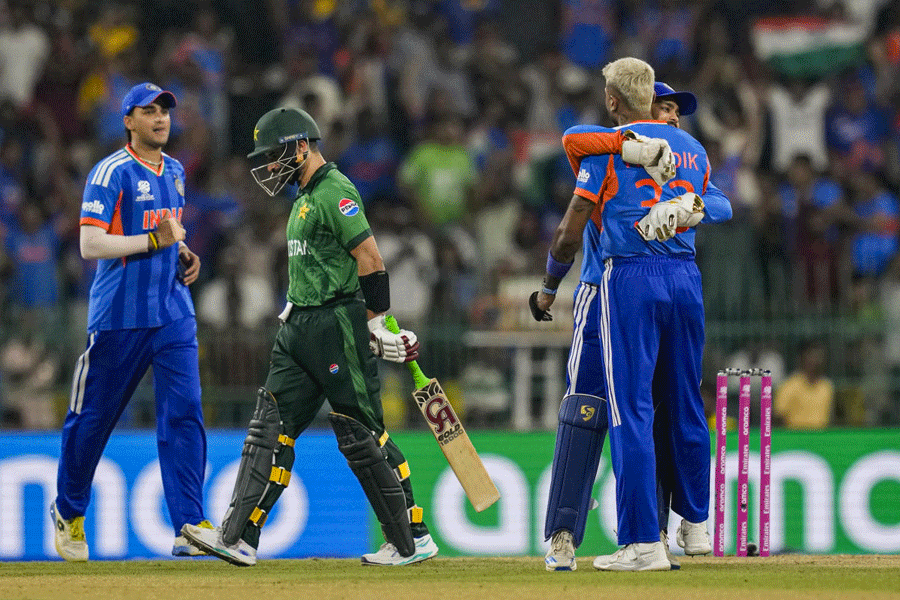 |
Pink is not what draws Naveen Patnaik. Peach is his colour. And if he has his way, the Orissa chief minister will soon turn Bhubaneswar into a “peach city.” Changing the colour of the Orissa capital — along with its image — is one of his “priorities” these days, but he doesn’t want to talk about his “private plans” in public. Certainly not when a cassette spins and he keeps glowering at it, wondering aloud why “that thing” can’t be clicked shut!
Clearly, Naveen Patnaik is not one of those garrulous politicians who go on endlessly about themselves. In fact, if there is anything he despises, he tells you at the beginning of an hour-long conversation, it is talking about himself. Patnaik, into his second term as chief minister, doesn’t mind answering questions about his government, though. Ask him what it has done over the last eight years or so and he lets out a torrent of words. But the torrent turns into a trickle when you ask him about him or his family — regarded as the state’s “first family,” with Biju Patnaik, his late father, widely seen as the “maker of modern Orissa.” He bristles, almost imperceptibly, when prodded. “Let’s leave it at that” is his signal not to nudge him any further.
On a recent morning at Naveen Nivas, the house his father built — four years after Naveen was born in Cuttack in 1946 — and named it affectionately after the youngest of his three children, Naveen Patnaik seems completely at ease with himself, wearing a green polo-neck T-shirt and a striped lungi. With his grey stubble and a thatch of tousled silver hair, he looks somewhat dishevelled — but certainly less starchy minus his trademark white kurta and pyjama.
Patnaik has just emerged (seemingly unscathed) from a meeting held in an adjacent room with a legislator from Puri district, known more for his brawn than his brain. He apologises for the delay caused by the unscheduled meeting with the member of the Biju Janata Dal, the party he founded in 1998 after splitting his father’s Janata Dal.
In the cavernous living room where we meet, his and his father’s memories jostle for space. Next to a laminated photograph of a turbaned Biju Patnaik wielding a sword, a memento of the newly formed East Coast Railway presented to Naveen Patnaik sits on a glass-fronted shelf. In a proud corner stands a shield flanked by two elephants, a gift from former Tamil Nadu chief minister J. Jayalalithaa to former Orissa chief minister Biju Patnaik.
Naveen Nivas, where Patnaik stays, steadfastly refusing to move to his official residence, is actually a bungalow split into two by a driveway. It’s very close to — almost within shouting distance of — Bhubaneswar airport and, in some ways, harks back to Patnaik’s gone-by, jet-setting days.
To give Bhubaneswar a distinct identity, a la Jaipur, Patnaik wants to have the Orissa capital painted peach, with, of course, a touch of white, another colour of his choice. The state secretariat has already changed to peach at his bidding and other government buildings are expected to follow suit. Orissa information and cultural affairs minister Debasis Nayak has requested the central government offices in the state capital to “respect” the chief minister’s wish and repaint their buildings.
Not surprisingly, art was Patnaik’s favourite subject at Doon School and he credits his interest in the subject to his art teacher, Rathin Mitra. “He was a wonderful master,” Patnaik says. Hooked though he was on oil painting, he never really saw himself as a professional artist. But then, he had no idea what he would be when he grew up. As a matter of principle, Biju Patnaik had never told his children what they should do when it came to their careers. “We had a very independent upbringing,” Patnaik says.
At Doon School, art aficionado Martand Singh was among his close buddies. Later on, both would join hands to set up the Indian National Trust for Art & Cultural Heritage (INTACH). Another classmate he distinctly remembers is Sanjay Gandhi, the late son of Indira Gandhi, with whom he briefly shared a hostel room. “He was mechanically inclined, always tinkering with something or the other,” he says with a smile of Sanjay Gandhi, who died in a plane crash.
Proud of his parentage, Naveen, who did his BA from St Stephen’s College in Delhi, stayed clear of his father’s world for years, choosing, instead, to dabble in the world of glitz and glamour. At the Psychedelhi, the boutique he opened with Martand Singh in a five-star Delhi hotel in the 1960s, he counted the Beatles among his clients. The boutique also supplied London outlets such as Annacat and Mr Fish with clothes, helping Patnaik to build his association with Diana Vreeland, then editor of Vogue. Vreeland introduced Patnaik to Jacqueline Kennedy, the widow of the American president John F. Kennedy.
On her 1983 trip to India, Patnaik took Jackie Kennedy, then a senior editor at Doubleday, and her son John, in India on a research project, to Jaipur, Jodhpur, Lucknow and Hyderabad. Soon afterwards, his first book A Desert Kingdom came out, edited by Jacqueline Kennedy. Patnaik had become a writer. Two more books followed. “She was extremely generous and had a great sense of humour,” he says, pointing to his framed picture with the Kennedy widow taken at his book launch party in New York.
The rarefied world Patnaik lived in came tumbling down in April 1997 when his father died. After brother Prem, a Delhi-based industrialist, and sister Gita Mehta, a US-based writer, refused to take on the mantle of politics, the responsibility fell on him. But a reluctant Naveen Patnaik argued he had never lived in Orissa and had visited Bhubaneswar only on occasions. Moreover, he didn’t speak Oriya, the local language.
Finally, he says what changed his mind was a meeting with the then Prime Minister, I.K. Gujral, who had called him to his parliamentary office. “It was hard to say no to the Prime Minister,” he says. And, the rest, as they say, is history.
He has proved political pundits wrong and survived as a politician. His crusade against corruption won him a second term. “I will complete my 10 years in politics in June,” the 60-year-old leader says, a tinge of pride in his voice. Today, he doesn’t regret his decision to join politics. With time, he says, life changes and today he looks back on his glamorous past as an “education.”
Like his father, Naveen Patnaik is not overtly religious but he “prays” every morning to “no one in particular” before he leaves for his office in the state secretariat. At heart, he stresses that he is secular and that his party’s alliance with the BJP is tied to “a national agenda for governance.”
After agriculture, irrigation and rural and tribal development, Patnaik has now focused his attention on industry, signing more than 40 MoUs. But Patnaik’s dream of an industrialised Orissa has hit a mounting wall of villagers who steadfastly refuse to give up their land for industrial projects. He describes as “unfortunate” the 2006 police firing on an anti-displacement agitation in Kalinganagar, which killed 13 tribals. The Rs 51,000-crore Posco steel project, the biggest foreign direct investment in the country, is also mired in protests over land acquisitions.
Patnaik says his government is trying to tackle the issue in a “humane” way. “What I want is peaceful industrialisation,” he says. His voice betrays his frustration, though. “What’s all this being done for, but to benefit the state and our people,” he says, shaking his head.
He feels the Manmohan Singh government is “not very responsive” to the needs of Orissa. The Prime Minister, he says, has visited the state only once. “The Union government can do a lot more for poor states like Orissa,” he moans.
Clearly, Patnaik is no longer the high priest of hedonism. Today, he would rather be seen as “someone” working to better the lot of his people. His work as chief minister has given him “untold” satisfaction, a sense of fulfilment. He will never forget the day he met the Kalahandi tribal who had just crossed the poverty line on his own initiative. “He had less than an acre, but decided to diversify and plant bananas all over the land. It was a huge success,” he says. His face glows peach.










